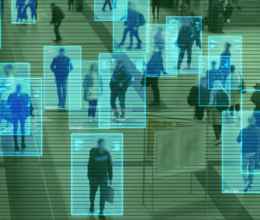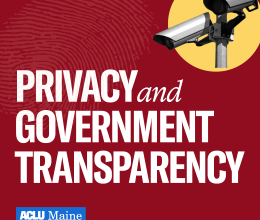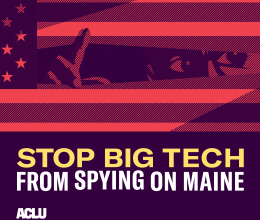AUGUSTA – Maine has enacted the country’s strongest statewide facial recognition law. Maine’s law prohibits the use of facial recognition technology in most areas of government, including in public schools, and for surveillance purposes. It strictly regulates how law enforcement officials may use facial recognition technology.
The bill, LD 1585, passed unanimously through both bodies of the Legislature, and became law without action from the governor.
The bill sponsor and representatives from the ACLU of Maine, the Maine State Police (MSP) and Maine Department of Public Safety (DPS) participated in negotiations that resulted in the compromise bill. It was voted out of committee with unanimous and bipartisan support.
“This is a huge victory for privacy rights and civil liberties in Maine,” said bill sponsor Rep. Grayson Lookner (Portland). “It’s also a victory for bipartisanship and cooperation. I hope that Maine can provide an example to other states that want to rein in the government's ability to use facial recognition and other invasive biometric technologies.”
The ACLU is leading a nationwide movement to defend privacy rights and civil liberties against the threat of facial recognition. As part of ACLU-led efforts, municipalities across the country have regulated the use of facial recognition technology, including a successful campaign last year in Portland, Maine, supported by the ACLU of Maine.
“Maine is at the forefront of a national movement to preserve civil rights and liberties in the digital age,” said Alison Beyea, executive director at the ACLU of Maine. “Democracy is stronger and communities are safer when we have clear rules and accountability for how governments use new and emerging technologies.”
Maine’s law stands in sharp contrast to the only other statewide approach to regulating face recognition in the United States, a law passed in Washington state in 2020. That law, which was backed by Microsoft, authorizes police across the state to use facial recognition technology to conduct mass surveillance of people’s public movements, habits, and associations. A coalition of civil rights, religious, and community organizations led by the ACLU of Washington opposed the law.
“Maine is showing the rest of the country what it looks like when we the people are in control of our civil rights and civil liberties, not tech companies that stand to profit from widespread government use of face surveillance technology,” said Michael Kebede, policy counsel at the ACLU of Maine. “The overwhelming support for this law shows Mainers agree that we can’t let technology or tech companies dictate the contours of our core constitutional rights.”
Maine’s law prohibits public officials and public employees at the state, county and municipal levels from possessing and using facial recognition technology, with extremely limited exceptions.
Under Maine’s rules, law enforcement may request a facial recognition search from the FBI and the state’s Bureau of Motor Vehicles (BMV) if they have probable cause to believe an unidentified person in an image has committed a serious crime. The BMV and the Maine State Police are required to collect data on search requests from law enforcement. The law stipulates that the results of a facial recognition search do not alone constitute probable cause for law enforcement officers to arrest or search a person. Individuals may bring a lawsuit if they believe a government agency or official has violated the law.









